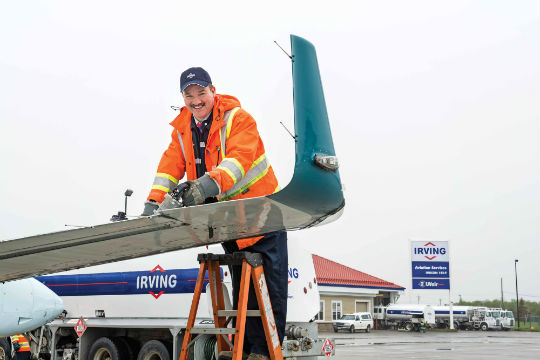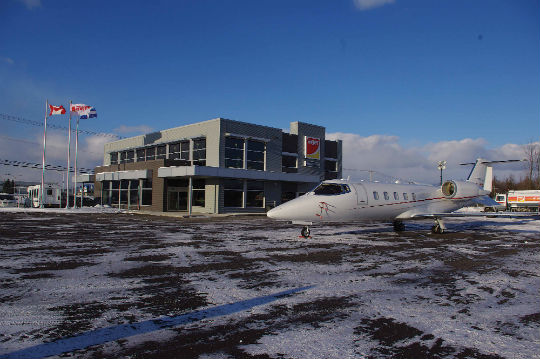Estimated reading time 11 minutes, 38 seconds.

Ramp technician Jim Philpot services an aircraft at Irving Oil’s FBO in Gander, N.L. Irving Oil Photo
John Wraga keeps his finger on the pulse of fixed-base operators (FBOs) in the United States—especially the 800-plus that are independent. As founder and executive director of the Boston-based Independent Fixed Base Operators Association (IFBOA), he has seen firsthand the industry’s ups and downs of the past decade.
“Everything was going well and then 2008 struck.” He recalls the slump lasted a few years. “To 2011, it really hurt our FBOs. Fuel sales dropped, aircraft sales went down the tubes; maintenance on airplanes was delayed.”
Many smaller operations were snapped up by the bigger FBOs. “I don’t know how many we lost, but most of our members came through, and since late 2012/early 2013 business has really picked up for us.” He said an unofficial survey of IFBOA members showed 2014’s average profits were up 12 per cent.
It’s a picture common to FBOs across the continent. Reporting in from the U.S. West Coast, Brad Wollen, vice president of aircraft sales with Clay Lacy Aviation, said, “As a whole, the FBO industry is pretty healthy right now.” Clay Lacy has two FBOs: one in Van Nuys, Calif., with about 300 employees and 70 managed jets, making it the largest charter operator in the Western U.S., and a smaller one in Seattle, Wash., which is “more of a gas station.” Wollen said he has noted a lot of consolidation in the FBO business, where larger companies like Landmark Aviation are buying up some of the independent FBOs.
The health of Canadian FBOs is more directly linked to their regional location. Ian Wilson, vice president of sales and marketing at Skyservice, said: “The FBO industry here in Toronto as a major centre will look vastly different than it might do in Calgary for instance, because of economic influences.” Skyservice has three FBOs in Montreal, Toronto and Calgary. “I would say Toronto is the healthiest, with Montreal being the second. But we are seeing a bit of an upside on the Calgary market,” continued Wilson.
In Quebec, Denis Jacob, president and CEO of Avjet, thinks the FBO business there is generally robust, too. “The general aviation business is not that bad,” he said. “We have seen a change in the last few years. People are flying their own aircraft and now we can see the business picking up—at least at our locations.”

Avjet president and CEO Denis Jacob says business is picking up for the Quebec-based FBO chain. “We have seen a change in the last few years,” he told Skies. Avjet Photo
Further east, Irving Oil maintains FBOs at Gander, Goose Bay and St. John’s, Nfld. “Newfoundland and specifically Gander used to be one of the most common stops in North America—business was strong and traffic was heavy,” said Susan Duffley, Irving Oil’s jet fuel sales and operations manager for Canada and the United States.
“In 2008, the industry began to see a steady decline in corporate traffic as a result of the recession,” she continued. “Also, the longer range of newer, more efficient corporate jets has reduced the need to fuel at Gander on the great circle routes. Today, however, commercial activity is very healthy and steadily growing.” 
Avjet operates five FBOs in Quebec City, Montreal (Trudeau), Montreal (St-Hubert), Gatineau, and Sept-Îles. The company’s flagship FBO is its brand new, state-of-the-art facility in Quebec City, shown here. Avjet Photo
Bricks and mortar
Despite the steady business, FBOs have their individual concerns. Clay Lacy’s Wollen has encountered a challenge with lease fees, for example.
“The municipalities own the land and we own the buildings,” he said. “We pay a monthly stipend to the county under a 30- or 35-year contract, but every three years or so, they raise the rates. You can’t just pick up and leave. We just spent $11 million on a new hangar here about five years ago, and now they want to raise our rates a good 40 per cent.”Avjet’s Jacob faces a similar concern in the company’s Quebec City FBO, where two years ago they constructed a new building. “Some rules in place are quite costly,” he said. “People do not realize that it costs two million to build and because of all the rules it costs four and a half instead of two.”He said that’s partly because the ramp has to handle everything from Cessna 150s to Airbus 310s. “That is a challenge we have—it is always difficult to pass on those costs.”
But, he added, Avjet maintains great relations with airport authorities. “They need money for development and a way to pay for it. If we work together with them for the development of the airport, there will be more in it for us.”
At Skyservice’s Toronto FBO, it is the Greater Toronto Airports Authority (GTAA) that owns the land, said Wilson. “You pay a base rent to them but it’s like any other thing in real estate: The price of renting land or buildings typically goes up per annum. But with us, it has been consistently within market levels.”
Personnel shortage?
IFBOA’s Wraga sees a looming problem for business aviation that may erode FBO business in the future: a lack of pilots and mechanics. “They are all taking commercial jobs,” he said. “And there is not a lot of people going into flight training anymore. Maybe the younger kids have lost interest in flying, but everybody is trying to promote new pilots. It is also true for mechanics who work at the FBOs. Very few of the younger generation want to be an aircraft mechanic any more—it’s hands-on, dirty fingers type of work.”
Wollen noted a similar situation in the United States.“We are running out of pilots,” he said. “A lot of kids aren’t learning how to fly any more. Because first of all, it is expensive to get a private pilot’s licence and then once they get the licence, what are they going to do with it? You could go to a commuter airline or become a flight instructor, but you have to fill up all this time to get a job and unfortunately the pay is so low. You are paying hundreds of thousands of dollars to get all your ratings, etc., and then you get a job flying commuter airlines for $25,000 a year. It takes a while to work your way up to where you can really make some money.”
Skyservice’s Wilson doesn’t see such a problem happening in Canada. “In the U.S. and maybe in Europe that might be an issue, but in Canada they have been talking about it for years,” he said. “I used to be a pilot and have been hearing that rhetoric for the better part of 20 years.”

The Skyservice FBO in Toronto is the largest in the chain, which also has facilities in Calgary, Alta., and Montreal, Que. Skyservice Photo
Michael Denham, Skyservice’s director of FBO operations in Toronto, highlights the need for properly trained line personnel. “We see a lot of people coming in from business school who are under the impression that their theory has given them the ability to know exactly how an FBO runs,” he said. “When we put them out there, it’s a totally different world than what they were expecting. Skills-wise it is challenging; we have to start from scratch to train them. Even those who have past experience still need basic training.”
Jacob echoes that sentiment. “We do a lot of training and take all the steps we can to avoid an incident,” he said. “Human resources is a large part of our success. It’s a challenge.”
Stronger regulations help. “Our fuel suppliers are always increasing their QC [quality control], which means more time making sure that their standards are met from our end, and this ensures customer service levels are at our standards,” said Denham. Most regulations are justified and make sense, in his opinion. One regulation he’d like to see—to reduce risk of the wrong fuel getting into an airplane—is enforcing proper fuel ID on aircraft wings by the tanks. “I would like to see more ID—some aircraft don’t specify if it is jet fuel or avgas.”
Commodity price downturn
The precipitous drop in crude oil and other commodities, while severely impacting resource-related aviation activity, has an offset of sorts: A reduction in fuel prices. “You are in fact seeing more and more airplanes flying because fuel is cheaper,” said Wollen. “So it is working for us.”
But in oil and gas-centred Calgary, reduced fuel prices don’t offset the reduced activity. “What we see now in Calgary is drops in fuel volumes, drops in traffic and so on,” said Wilson. “So we as a company have to take a different approach to get more traffic on the ramp, be it charter or contract type work. It is a matter of looking for new business and becoming more competitive within the businesses there.” He said Skyservice wants to carve out a bigger piece of the Calgary pie within the existing market. And then when the pie gets bigger from an economic turnaround, that piece will also grow.

FBOs have felt the pinch as commodities prices have declined. On the flip side, fuel is cheaper, which encourages people to fly. Avjet Photo
Commodity pricing effects are also felt in Quebec. “In Northern Quebec there is a lot of mining and that is down, particularly for the smaller commercial operators who are losing market,” said Jacob. “There are a lot of aircraft on the ground or they have to reduce their activities, as a big part of their problems are related to the mining industry.” Helicopter business is down too, he noted.
Looking ahead
To deal with the personnel challenges, Wollen said Clay Lacy is sponsoring a program in Seattle, with Boeing’s help, called the Aviation High School. “It opened last year and the young kids are just great,” he said. “And they are not all vying to be pilots either; a lot of them want to be aeronautical engineers or join the FAA.” Going forward, he wanted to be prepared for increased government regulation, which he sees coming. Skyservice’s Denham believes technology will help “make sure all our systems are digitally backed up as well as having support in the event of any power-related issues. And all our client info is digitized for the front desk, so that we can generate reports effectively.”
In her eastern FBO region, Duffley recognizes the challenges in the industry but noted Irving Oil is continuously on the lookout for new ways to create value for its customers. “Irving Oil is always monitoring changes in the industry and exploring new solutions,” she said. “There are several models in the FBO business; but for us, our guiding principle is to always provide our customers with high quality service.”
Despite the challenges, IFBOA’s Wraga sees a rosy future. “The biggest opportunities for FBOs are coming in the next five years,” he said. “Aircraft sales are going to be huge. The biggest problem will be finding good people. It used to be the cost of fuel, but that has come down dramatically and we expect it to stay low for at least the next year to 18 months. It looks like the future is bright.”

The biggest opportunities for FBOs are coming in the next five years as aircraft sales increase, according to the executive director of the Independent Fixed Base Operators Association. Skyservice Photo
British aircraft services company BBA Aviation may be thinking along similar lines. Its recent proposal to buy U.S. competitor Landmark Aviation for US$2.065 billion will, if successful, create the largest fixed-base operator in the world when merged with BBA’s Signature Flight Support business. Reuters gathered bits of insight into BBA chief executive Simon Pryce’s mindset in a Sept. 23 media call. “This is the right time to buy this asset,” Pryce said about the acquisition.
Graham Chandler is a Calgary-based freelance writer with specialties in energy and aviation. His work appears regularly in several oil and gas publications as well as international magazines such as Saudi Aramco World and Air & Space/Smithsonian. Along with degrees in physics, business and archaeology, he is an engineering graduate of the US Naval Test Pilot School.

